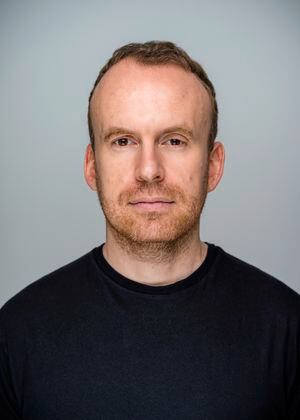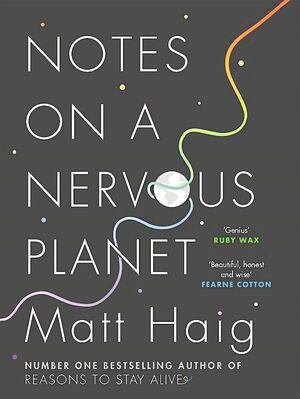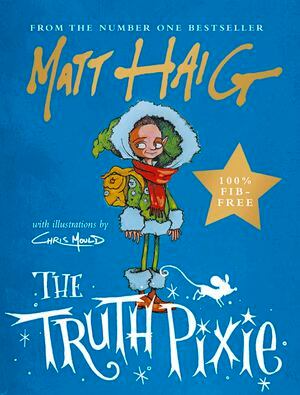‘I’m writing from inside the storm’
His books about mental health have helped thousands of people, but Matt Haig insists he is no expert on the subject – he’s just an ordinary person trying to make sense of the modern world. Nick Mann spoke to him ahead of his appearance at the Guernsey Literary Festival next month...

MATT HAIG quit Twitter shortly after this interview.
We had spoken about the use of social media and the links with anxiety and depression, one of the themes in his latest book, Notes on a Nervous Planet.
‘It’s not forever. I just need to cool it for a while. A combination of being opinionated and also sensitive is not a good one for Twitter,’ he said as he logged off.
It might well be a lesson for all of us and, to use a well worn cliche, a case of practising what you preach.
Notes on a Nervous Planet sees Haig exploring the connections between mental health and the world around us and follows on from his first book about mental health, 2015’s Reasons to Stay Alive, which details his journey from the edge of suicide as a 24-year-old in 2000, racked by severe depression, anxiety and panic attacks.
Without some gentle persuasion from his publisher and a well-received blog, these mental health books might never have happened.
‘I didn’t know if my story was unique enough, or anything special, but she said that was the point – people would relate to it,’ he said.

Haig had already published several novels, including The Humans, as well as children’s books, before embarking on writing that has reverberated strongly.
It was some 15 years after being stood on a cliff that he wrote Reasons To Stay Alive.
‘I wrote it quickly, like it was building up inside me. It was a kind of therapy writing it. Emphasising it, writing about it, that makes it more manageable and takes away that stigma you have about yourself. A lot of the stigma is self stigma.’
It has become a book that many look to for guidance.
‘At the time it threw me. I wasn’t a doctor, but I was getting a lot of emails from people who were in a vulnerable situation asking for advice I couldn’t give.’
He has come to accept that role more, though.
‘For me as well, it’s made me feel I’m not in perfect health all the time, but in that state I feel less alone now. I have so many emails with people who have their own stuff going on, their own panics and troubles – the story I have with my mental health and depression is no different.’
Haig agrees that there is a barrier to people confronting their mental health in the way there is not with their physical wellbeing.
‘We’re definitely talking about it more. I’ve been happy, and other writers have been happy, to contribute to that conversation. Most people don’t stigmatise mental illness, but I still think we treat it differently to the rest of health, to physical health. If a celebrity shares a story of suicide or depression, when it’s written in the media it’s still “admits and confesses”, it’s still slightly sensational.’
Things have moved on from the infamous 2003 Sun headline of ‘Bonkers Bruno’, but that attitude was still there to a degree, he said.
‘But the bigger problem is not the stigma, but that a lot of modern life is quite taxing for our mental health.’
He says there is growing evidence about this.
‘We need to get up to speed about how the way we live affects our mental health.’
That was the reason for writing Notes on a Nervous Planet – it was a way of understanding his own mental health a bit better, he said.
‘I started to realise there are things I do to make it worse and things I do to make it better.
‘It might not be straightforward, but knowing links are there is a comfort. For a while there was a fear that it was totally random, that I was unlucky, it’s my body chemistry and there’s nothing I can do to make it better. But knowing there’s lifestyle aspects to it is comforting.
‘I’d read about evolutionary psychology that says how our minds are effectively geared for life 30,000 years ago, hunter-gathering communities. But life is so different now. In those days, and up until a few centuries ago, a human would only encounter 150 people in a lifetime, now we can see that number in our minds on social media before we get out of bed. We are in a very different world but are still the same human beings we were before.’
Despite his work investigating the issue, Haig says he is still not perfect at managing modern life and his own mental health.
Ironically enough, given his later disconnection from Twitter, he said that was one thing he was getting better at.
‘I used to get in all kinds of arguments, literally arguing with strangers.’
It was about using things like social media better, he said.
‘You can’t put the internet back in the bottle. It’s more how we use it. For me, I really try to stop myself getting into long-running political arguments for hours on end.’
Another trick has been moving his phone out of the bedroom.
‘I used to look at my phone in the night, it’s terrible for sleep, although 80% of us do sleep beside our phones in the UK. I try and put it in the kitchen, downstairs, so I have the incentive to get up and get breakfast before using it.’
He has a dog but will leave the phone at home when taking her for a walk.
While you will find some of his work in the self-help book sections, he does not predominantly view them like that, or as something that will provide all the answers.
‘I’m writing from inside the storm. It’s more like a weather report, saying what’s going on and trying to work it out. I’m not leading the way,’ he said.
‘With Notes just out, people do ask questions, but everybody is different, some people have no problem at all with the way they use technology, but others use it for an hour and feel really down. There is no foolproof, catch-all thing that works for everybody.’
One thing that helps Haig is running.
‘My dad was a runner and he can still run further than me in his early 70s. When living at my parents home, dad’s advice was to go out and go running. I tried it a few times and it wasn’t working, but after the fourth run I started to feel a bit lighter, a bit healthier. I got more into it and addicted to it as a healthy addiction. It’s a good way to get out the house, but I have to balance it with yoga as I get a bad back. Particularly with anxiety it gives all the energy somewhere to go. When I started, I was still having big panic attacks, but running was that safe space.’
Running replicates the symptoms of a panic attack – heart racing, breathlessness, adrenaline rushing, but in a way that makes sense to your body, he said.
There remains a funding disparity between mental and physical health services, despite politicians’ happiness to talk about and pay lip service to mental health, he said.
‘In real terms still only 11% of the budget goes into mental health funds. We still have a long way to go before it is taken seriously enough. But beyond that we need more integrated understanding of mental health. We shouldn’t just have a mental health minister, although we should have that, but look at everything. Every aspect of life should be looked at from a mental health perspective.’
Research has said that 50% of mental health problems are established by age 14.
‘Part of the problem with education is the amount of testing they have. One of the stressful things about the internet is the same thing that is stressful about testing – it’s comparison, failures, grades.’
Haig is contemplating a third book on mental health, looking at how ecosystems and the world at large impact on it.
Haig always liked reading and writing, with a background in English, but he would not have become a writer if he had not suffered a full- blown breakdown in his 20s when living a hard-partying life in Ibizia.
‘It forced me to reassess myself. Also, practically, I couldn’t go out – agrophobia, panic disorder, three years being in a real mess – but life goes on, you are spending money, we had a lot of student debt, I had to earn.’
He was writing as a freelance journalist.
His now wife Andrea’s mother was in recovery from a serious illness.
‘We’d go up and live with her parents. I had a lot of time on my hands, it was a bleak time, but to cheer myself up I tried a novel. It wasn’t a career plan.’
Many people come to Matt Haig through Reasons to Stay Alive, while he picks out The Humans as the first novel that he would recommend.
He says it was the first book he had written for the right reasons, with no pretensions, and the first time he had written a positive book.
In that 2013 book an alien takes over a human body and, as it adjusts to life in Cambridge, is baffled and repelled by the world.
Haig has said he had the idea ‘because that’s how I felt when I was depressed’.

Matt Haig will do two sell-out talks at the Guernsey Literary Festival, one based around Notes on a Nervous Planet at 7.30pm on 3 May at St James and the other on his latest children’s book The Truth Pixie at 2.30pm the next day at the Festival Hub. Both events are sponsored by the International Stock Exchange and supported by Guernsey Mind and anyone who still wants to attend can email the organisers to be added to a waiting list.
The festival runs from 1-6 May. For more information visit https://guernseyliteraryfestival.com.





